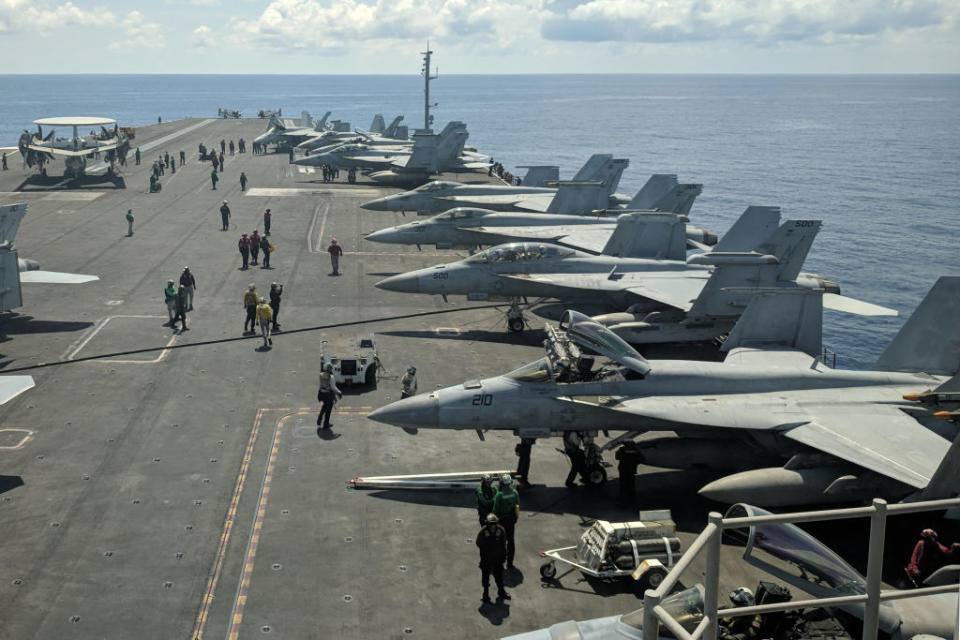'Chances of conflict rising' as Australian ships 'confronted' by Chinese forces
Australian navy ships have been confronted by Chinese forces while conducting an exercise near the contested South China Sea.
The incident, reported by the ABC, took place after five Australian naval ships joined US and Japanese forces in a joint exercise in the Philippine Sea.
The details around what’s been described as an unintentional interaction are scant but it comes as tensions between China and Western nations continue to rise, with the US Defence Secretary Mark Esper declaring America will step up its challenges to Beijing's territorial claims in the region, calling them unlawful.

The encounter with Chinese authorities took place some time last week after Australian war ships joined USS Ronald Reagan Carrier Strike Group, which includes the US Navy’s guided-missile cruiser USS Antietam and guided-missile destroyer USS Mustin and the Japanese Maritime Self-Defense Force’s Akizuki-class destroyer JS Teruzuki.
The ships were travelling to Hawaii where they will conduct war games.
Head of the Australian Joint Task Group, Commodore Michael Harris, said the opportunity to work alongside Japan and the US was invaluable.
“Maintaining security and safety at sea requires navies to be able to cooperate seamlessly,” he said in a statement Tuesday.
“The combined activities between our navies demonstrates a high degree of interoperability and capability between Australia, Japan and the US.”
The 🇦🇺 Task Group has joined the 🇺🇸 and 🇯🇵 in the Philippine Sea prior to transiting to Hawaii for Exercise RIMPAC. An important opportunity to exercise at sea with our close friends in support of our shared views of a prosperous, open & stable region. ➡️ https://t.co/jfieE4J8ga pic.twitter.com/fU6KkqNb4z
— Department of Defence (@DeptDefence) July 21, 2020
Chances of conflict ‘rising’
Richard McGregor, Senior Fellow with The Lowy Institute said reports about the “confrontation” are nothing to worry about, but warned the chance of conflict in the region was ratcheting up.
“You can absolutely be sure that any time Australian ships are in the South China Sea, they will be tracked by the Chinese,” he told ABC Radio National on Thursday.
“I don’t think confrontation is the right word, but they will be hailed, they’ll be asked what they are doing there and [asked] to explain themselves.”
Unlike the US which carries out the more provocative “freedom of navigation” exercises in the South China Sea, Australian ships don’t travel within 12 nautical miles of artificial islands contested by China.
'Pathetic': US mulls unprecedented move against Chinese government
'Bear all consequences': China's threat over Australia's Hong Kong move
Given the increasing presence of the US Navy in the region, there are growing concerns heightened tensions could spark actual conflict.
“Generally speaking the chances of some kind of conflict in the South China Sea are rising,” Mr McGregor said.
Earlier this month, the US sent two aircraft carriers to the South China Sea. One is considered a deterrent, two is considered a substantial show of force.

Others have expressed concern that Australia will be drawn into an escalating Cold War 2.0 as US President Donald Trump tries to boost his re-election prospects by picking a fight with China.
Speaking to Yahoo News Australia, former Secretary of the Australian Department of Defence, Paul Barratt AO, voiced concern about Australia joining in the latest military exercises with the United States.
“No doubt that there are questions about the behaviour of China that ought to concern us,” he said.
“And we don’t accept their claims, or a great deal about their claims in the South China Sea.”
While China has increasingly demonstrated a disregard for agreed on international norms, Mr Barratt argued that it is still better to engage with China diplomatically, and in a bilateral way.
Trump ‘raising the temperature’ ahead of election
“What’s going on now is that Trump is deliberately raising the temperature in the bilateral relations between the US and China,” Mr Barratt told Yahoo News Australia.
“I just don’t think we should be party to anything that looks like containment of China, and looks like a diplomatic pile on.
“Australia regularly goes to naval exercises around Hawaii, but I’m questioning whether it’s a good idea at this time of high tension between the US and China, which has little to do with us ... to visibly participate in a US led operation in the South China Sea.”
Mr Barratt said the Australia government should assert its rights in the region but do so with clear independence.
'Never succeed': China slams US 'interference' in Hong Kong affairs
China filmed 'burning documents' after US shuts down consulate
'Crossing the Rubicon': America's latest move against China 'no joke'
In light of China’s stated objective of reunification with Taiwan, bringing the country under the auspices of Beijing, many observers view the South China Sea and the Taiwan Strait to the north as potential flashpoints for future conflict.
A prospect which some fear could be hastened by a desperate and bellicose White House.
“I think Trump is desperate about the situation in the US and he will have what we would call a khaki election,” Mr Barratt said.
“He will be raising the temperature and the fear about the outside world ... and using the forces of the US and a very hawkish Secretary of State to redirect towards national security issues rather than how he’s handled the coronavirus.”
Do you have a story tip? Email: newsroomau@yahoonews.com.
You can also follow us on Facebook, Instagram and Twitter and download the Yahoo News app from the App Store or Google Play.




